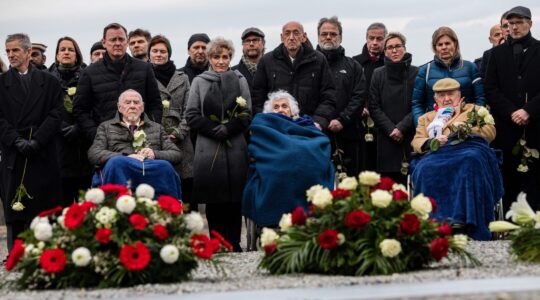ATHENS, Greece (JTA) — Until recently, Greece had gone a long time without violent anti-Semitism.
The few manifestations of anti-Semitism here appeared mostly in the form of graffiti, racist screeds in marginal, neo-fascist publications, or the occasional verbal epithet leveled against a Greek Jew.
But then came the Gaza war a year ago, inflaming passions against Jews and setting off a series of anti-Semitic incidents.
The latest was the torching this month of the Etz Hayim synagogue on the Greek island of Crete. Thanks to two Albanians and a Palestinian immigrant that live across the street, the synagogue’s destruction was avoided.
Even more disturbing to Jews here than the attack itself was the lack of government condemnation. Not only the government, but the press, political parties and the Greek Orthodox Church were silent.
It took until last Friday, a week after a second arson attack on the synagogue and following a rebuke by the Anti-Defamation League, for the Greek government to respond.
“The attack on the Etz Hayyim Synagogue not only constitutes an attack on one of the remaining Jewish monuments in the island of Crete, but also an attack against the history and the cultural heritage of our homeland, Greece,” Greek Prime Minister George Papandreou wrote to the ADL. “The Government, I personally as well as the entire Greek nation condemn this abominable act in the strongest possible terms.”
A week earlier, ADL National Director Abraham Foxman had written wrote Papandreou a letter calling on him to “publicly and forcefully condemn” the arson attack.
“It is disappointing that the Greek government has so far failed to condemn the shocking arson attack targeting a synagogue on the island of Crete,” Foxman wrote on Jan. 14. “The previous government remained silent when synagogues were attacked and Jewish cemeteries desecrated, sending a message of insecurity to the Jewish community and of impunity to those who perpetrated the attacks. We hope your government will change that policy and declare that anti-Semitism has no place in Greece.”
A day later, the same synagogue was attacked again by arsonists, this time causing extensive damage.
It’s been an unsettling year for Greek Jews. Until the upsurge in anti-Semitic attacks beginning more than a year ago, 1982 marked the last time there was a violent attack against a Jewish establishment. That was during Israel’s war in Lebanon, when a crude bomb was placed at the entrance of a Jewish-owned travel agency. Police sappers dismantled the bomb.
At the time, any major incidents of anti-Semitism were condemned by the government and dealt with swiftly.
Greek Jews point to the 2008 trial of a well-known lawyer and anti-Semite, Kostas Plevris, as a sign that things had reached a turning point.
Plevris was sued by the Greek Chapter of the Helsinki Human Rights Monitor and the Anti Nazi Initiative, a Greek organization combating Nazism, for incitement to violence against the Jews with his 1,400-page book “Jews: The Whole Truth.”
After a year-and-a-half and two trials, Plevris was acquitted unanimously of any wrongdoing by a five-judge panel in a court of appeals. In one trial, the prosecutor called the anti-Semitic tome a “scientific work.”
Anti-Semitic incidents surged in 2009, with nine cities reporting attacks. The Jewish cemetery in the city of Ioannina was vandalized four times. In an incident on June 3, graves and a Holocaust memorial were destroyed, and bones and bodies were unearthed, including the remains of the mother of the current president of the city’s 50-person Jewish community, Moisis Elliasaf.
Greek Jews protested that authorities did little to find the perpetrators. Jewish outrage grew when a high-ranking police officer caught in the cemetery immediately after one of the incidents was not questioned by authorities. Neither the mayor, the governor nor the Metropolite Theoklitos — the highest-ranking priest in every Greek city – condemned the incident.
After the launching of Israel’s operation against Hamas in Gaza a year ago, anti-Semitism seemed to erupt.
George Karatzaferis, the leader of the far-right political party LAOS, which has 15 seats in Parliament, wrote an article in his weekly newspaper A1 calling the Jews “Christ killers” and saying that the “blood of the Jews stinks.”
No one responded when the Central Board of Jewish Communities in Greece asked the speaker of parliament and political leaders to condemn the article. And with the exception of one highly respected Greek columnist, Pashos Mandraveli in the daily Kathimerini, the Greek media stayed silent, too.
Left-wing leaders who harshly condemned Israel for its actions in Gaza refused to condemn the anti-Semitic incidents or even join Greece’s commemoration of Holocaust Memorial Day in late January.
“There are no good Jews,” Jimmy Panousis, a well-known liberal radio personality and comedian, said on his radio show. “Jews are pigs and murderers, but fortunately their days are numbered.”
The newspaper Avriani, which blamed American Jews for causing the global economic crisis, warned that American Jews were plotting to set off World War III.
Piraeus Serafim of the Greek Orthodox Church warned of “Zionist monsters with sharp claws.” Salonica Anthimos, another church official known for his anti-Jewish statements, said Jews were being punished for killing Christ.
After the arson attacks in Crete, Greek Jews are increasingly anxious.
While Jews in Western Europe have suffered worse in recent years, Greece stands virtually alone for its lack of condemnation of attacks against Jews.
JTA has documented Jewish history in real-time for over a century. Keep our journalism strong by joining us in supporting independent, award-winning reporting.





